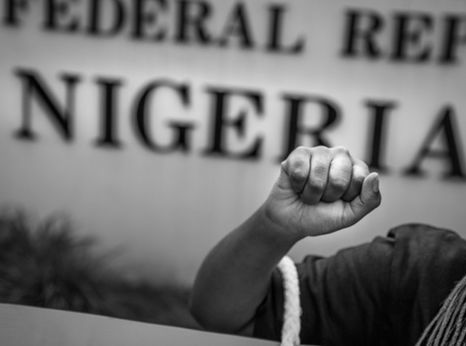Journalist must be released

On 23 October, the Federal High Court granted leave for the prosecution to allow witnesses and ordered Agba Jalingo’s trial to proceed in secret. This implies that the public will not be allowed to observe the process, which raises questions around the transparency and fairness of the trial against Agba. The prosecuting judge for Agba’s case withdrew after a video was leaked, where Justice Amobeda was caught on tape saying the journalist would be treated like Ken Saro-Wiwa – a rights activist who was sentenced to death by hanging in 1995.
Justice Amobeda was required to return the case file to the Chief Judge for reassignment following his withdrawal from the case, but he did not. Instead, he kept Agba’s case file for a month following his withdrawal, presumably to delay the process.
Who is Agba Jalingo?
Agba Jalingo is a journalist for the CrossRiverWatch news website. Jalingo was arrested on 22 August 2019 for publishing an article demanding the Cross River State government be held accountable for spending 500 million naira (approximately 1,071,240 GBP) to float the Cross River Microfinance Bank.
Jalingo spent 33 days in police custody without trial or access to his lawyer or family. He was charged with committing acts of treason, treasonable felony, publishing false information, and instigating terrorism. He is currently undergoing a secret trial and remains detained in Calabar Prison.
Crackdown on freedom of speech in Nigeria
In Nigeria, civic space continues to shrink as Nigerian authorities increasingly clampdown on the rights to freedom of expression and peaceful assembly. Authorities have intimidated journalists, bloggers and human rights defenders and activists, through verbal and physical assault, arbitrary arrest, detention and prosecution. Many journalists, human rights defenders and activists face charges such as defamation, terrorism, cyberstalking, kidnapping, criminal trespass and theft of state documents.
These charges are prosecuted under laws that allow the death penalty for those found guilty. The Nigerian Senate is currently considering two harsh bills relating to the right to freedom of expression online, including one, which proposes the death penalty for ‘hate speech’. These bills, supported by the Nigerian government, represent an alarming escalation in the authorities’ attempts to censor and punish social media users for freely expressing their opinions.
The proposed National Commission for the Prohibition of Hate Speech bill, and the Protection from Internet Falsehood and Manipulation and other Related Offences bill, give authorities arbitrary powers to shut down the Internet and limit access to social media, and make criticising the government punishable by up to three years in prison.
Taking action
Twitter: Tweets are impactful. Often, Nigerian authorities may not respond to official letters, but easily respond on Twitter. Sections can share tweets and messages below to President Muhammadu Buhari's official Twittter handles:
Additionally, you may target Governor Ben Ayade, the Governor of Cross River State. His petition to the police led to Agba Jalingo’s arrest and prosecution for reporting that he, “diverted N500 million meant for the state’s micro finance bank”. Governor Ben Ayade’s government is intolerable of criticism. Within the last six months, he has ordered the arrest and detention of two journalists and a lawyer who were critical of his government.
@senatorbenayade
#FreeAgbaJalingoNow
- Downloads
- Download in PDF
- Download in Word